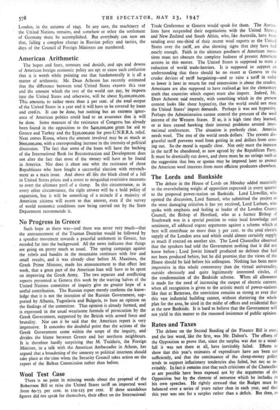Wool Test Case
There is no point in mincing words about the proposal of the Robertson Bill to raise the United States tariff on imported wool from 60-75 per cent. to 110-125 per cent. If these scandalous figures did not speak for themselves, their effect on the International
Trade Conference at Geneva would speak for them. The Ausu a- lians have suspended their negotiations with the United States ; and New Zealand and South Africa, who, like Australia, have been sending over one-third of their recent wool exports to the United States over the tariff, are also showing signs that they have had .nearly enough. Faith in the ultimate goodness of American inten- tions must not obscure the complete badness of present American actions in this matter. The United States is supposed to want a reduction of world trade-barriers. It is supposed to support an understanding that there should be no resort at Geneva to the cruder devices of tariff bargaining—and to raise a tariff in order to lower it later in return for real concessions is about the crudest. Americans are also supposed to have realised ,at last the elementary truth that countries which export must also import. Indeed, Mr. Dean Acheson said recently, with something which in the present context looks like sheer hypocrisy, that the world could not meet the United States' import demands. Perhaps it was not hypocrisy. Perhaps the Administration cannot control the pressure of the wool interest of the Western States. If so, it is high time they learned, or at least ceased hawking their internal problems around inter- national conferences. The situation is perfectly clear. America needs wool. The rest of the world needs dollars.• The present dis- graceful tariff prevents wool from getting in and dollars from com- ing out. So the moral is equally clear. Not only must the increase in the tariff be abandoned, as now agreed by the Republican Party. It must be drastically cut down, and there must be no strings such as the suggestion that fees or quotas may be imposed later to protect the American wool interests from more efficient producers elsewhere.


































 Previous page
Previous page